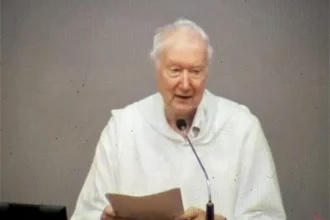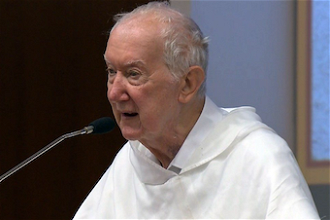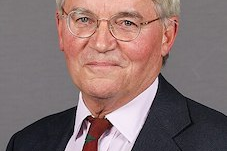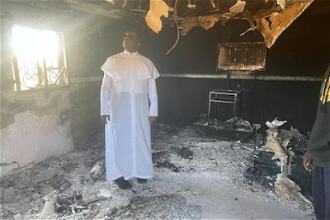Full text of Fr Timothy Radcliffe's second NCP lecture - Part 2
What sustained Congar in this time of suffering was not only his belief in the ultimate triumph of the truth but what he called le fait des freres, enfin, the fact of brethren. It was above all with his brethren and his friends that he could talk, knowing that he would be heard even if they disagreed with him.
In the Church we urgently need places in which we can speak and listen to each other, with confidence and without fear. We need spaces in which we seek the truth together with those with whom we do not initially agree.
We need spaces in which we can share our deepest convictions, without worrying about whether we have got it exactly right, where we can dare to be wrong, hoping that someone will spot the little nugget of truth in our fumbling words. ' The truth will set you free' the Lord tells us. So we too need spaces in which we can freely look for the truth.
There has been much criticism of the Synods of Bishops, in which there is little space for deep dialogue, as I know having taken part in three Synods.
But it is always easy to blame other people, especially the bosses.
We should rather ask what spaces we can create in our own parishes, deaneries and dioceses for free talk.
Speaking the truth in love is a very difficult art, that some of us have to learn.
How can we create a culture of truth telling where we are?
Do we say what we believe only to those who agree with us?
What spaces might we create to talk with those who disagree with us?
These spaces can eventually become places of joy. Many of my happiest times have been spent arguing with my brethren, tasting the pleasure of disagreement, the joy of debate.
There is the joy of not having to be right.
There is even, to borrow the title of a book by James Alison, which I have not read, 'the joy of being wrong'.
Scandals
Before I left England ten years ago, one of my greatest pleasures was a leisurely reading of the newspapers. Now I find it depressing. Every day I find the Church accused. We are accused of our failure to speak out for the Jews in the last World War, accused of corruption, above all priests and religious are endless accused of sexual abuse. Every day we are in the dock. These accusations are hard enough to bear if one lives in a community, but they must be almost unendurable if one lives alone.
How can one face the people, ashamed, wondering what they think? How can we bear all this with joy, or at least not mere depression?
We have to accept the shame. Jesus came to call sinner and not the righteous, and in this he has been highly successful! This is the scandal of the gospel, that God has made his home with prostitutes and tax collectors, and continues to do so.
The Church is indeed holy, but it is not the holiness of the Old Testament, which implies separation from the wicked. It is the scandalous holiness of Christ, who embraces the impure, the wicked, the weak, the failed and the dead. It is part of our sharing in Christ,'s priesthood that we bear this solidarity with sinful humanity.
On Good Friday we hear the word of Isaiah, he was despised and we took no account of him and yet ours were the suffering she bore, ours the sorrows he carried. But we thought of him as someone punished, struck by God, and brought low.
So enduring the shame of these scandals is perhaps our way of sharing Christ's passion, bearing the reproaches against sinners. Every generation has its own way of sharing that passion.
Ours includes the shame of all these accusation,especially concerning sexual abuse. Of course this means above all confessing our sins and reaching out to the victims, asking for their forgiveness.
Does it not also mean standing by our fellow priests who have sinned, and being at their side in their moment of public shame?
My impression is that at the Dallas meeting in the States, the American bishops were so overwhelmed with shame at the scandal, that maybe they were panicked into what looked like repudiation of the sinners.
As Christ stood by the sinners, so must we too.
I read that one bishop maintained the diocese could not be sued for the misdeeds of its priests because the priests are independent contractors!
The local newspaper asked the question: But would Jesus have described himself as an independent contractor?
There is the awful scandal of abuse. It would be terrible to compound that with the scandal of disassociating our Church from those who abused.I know that this raises extremely complex questions, to which I have no clear answers.
This is not the time to explore them. But at least let us not be panicked into the repudiation of sinners.
This may cause scandal, but it may be the scandal of the Gospel. I would add one other comment. I have noticed a profound ambivalence about the Church in the press. It is both accused and respected.
The Pope is both the great bogeyman of liberalism, and the one who offers the strongest moral leadership in the world. I have the impression that in this country the Church has more moral authority than at any stage since the Reformation, and yet journalists grab every possible opportunity to discredit the Church.
What's going on?
Perhaps two things: First of all, our society longs for moral leadership, but it is the morality of the Pharisees (at least as they are portrayed in the Gospels). They long for someone to lay down the moral rules, without ambiguity, and look to the Church to do this. But they are then scandalized, like the Pharisees, to see that we are weak and sinful.
They look to us for moral leadership but do not see that the heart of Christian morality is forgiveness and that God chooses a lot of pretty dubious and sinful characters as his friends and servants. Is the Church sometimes so relieved to be looked to for something, moral leadership, that it fails to offer the heart of a Christian morality, which is solidarity with sinners?
Are we bullied or seduced into playing someone else's game?
There is yet more to this ambiguity than this. The great shopping mall that is our world apparently offers satisfaction to every desire of the human heart.
All that one can ever need is for sale here. New desires are always being invented so that they may trap consumers in the mall endlessly searching for satisfaction. And yet we are haunted by the dream for more, of some impossible joy, so unimaginable happiness, which cannot be bought at Sainsburys.
The abiding fascination of the Church is surely in this, that it has been and is still the home to people who are marked with this provocative joy.
The abiding fascination of our society with people like St Francis of Assisi or Mother Teresa of Calcutta suggests that the hunger for that vast happiness is not yet dead.
Deep down we know that the shopping mall is ultimately boring. But if these saints are right, then joy demands of us a heroic adventure, which we fear to undertake.
We know that it invites us to leave behind the shallow contentment of the shopping mall and take to the road.
And this is very frightening. I would suggest that some of the ambiguity of the press about the Church derives from that divided heart. It longs to believe that this inexplicable, unimaginable joy is possible, but fears to discover that it is.If it is possible, then we must begin the painful journey. That is why there is an immense sense of relief when it turns out that the saints have feet of clay.
We need not hearken to them after all. What a relief!
Jean-Louis Brugu, a French Dominican bishop, wrote that he comes from a land which combines deep faith and virulent anti-clericalism. One was very intransigent with priests and religious, one wanted them to be exemplary, and no a single weakness of theirs was tolerated.
One shouted out one,'s scandal at the least of their faults, but the people expected the greatest understanding of their own faults.
The consecrated persons had become the substitute for a perfection dreamed of and judged impossible by the great majority of people, I think that our society is haunted by a dream of perfect joy, which it longs for and also dreads and hopes to discover is impossible.
That is one root of the ambiguity with which the Church is regarded. That is why, in the face of accusation, shame and scandal, we need to keep alive in our own hearts that dream of an impossible joy.
We too can be tempted to surrender it and seek contentment in the trivial.
I remember that when I joined the Order in 1965 as a very young 20 year old, I dreamed of becoming holy, maybe even a saint.
It was a tremendous sense of relief to discover that in the late sixties, this was an old-fashioned idea.
Now we aspired to the justice of the Kingdom.
Wanting to become holy seemed rather selfish and introverted.
It was a relief since it let seemed to let one off the hook of struggling to become holy. Yet that was a flight that cannot be sustained. The preacher must be touched by that mysterious joy which is the foretaste of the Kingdom.
But that dreamed of joy cannot be attained without a personal transformation, and so, like St Augustine, I find myself saying Lord, make me holy, but not yet,
If we can live even a tiny bit of that joy of the Kingdom now, then it will be contagious and the best preaching we can ever give. But it will evoke disbelief, sceptism and accusation, as did Jesus when he feasted with the prostitutes and the tax collectors.
Do not lose the plot! I have argued during these two lectures that joy is at the heart of our priestly vocation.
At this moment there are all sorts of reasons why we may feel demoralized, and we all succumb from time to time to gloom. Yet the Gospel that we are charged to preach summons us back to joy. It also awakens in us sorrow and anger, but not dead, flat depression. That contradicts the very meaning of our lives.
How can we sustain or revive that joy? Today I have looked at just some of the challenges that we priests face in our identification with the Universal Church and I tried, very inadequately, to suggest how in each case we may discover the glimmerings of a joy. The gap between the teaching of the Church, and above its moral teaching, and the experience of our society is so great that we may feel burdened with teaching what may seem remote, incomprehensible and unrealistic.
We live in that gap with divided hearts. And yet this can be a place of birth, of the Word becoming flesh in some new way, freshly incarnate in our secular world.
Birth is always painful but finally joyful. We must have the patience of midwives, as we gossip around the bed. Then there is the harsher pain when some of us may doubt some official declaration of the Church. How can we then teach and preach without loosing our integrity and truthfulness?
We need to open spaces of dialogue in the Church, where together we may rediscover the joy of seeking the truth, and even the joy of not being afraid to be wrong.
Finally there is the humiliation and shame we share in the accusations made against the Church we love. Here we must dare to be like Christ, who for the joy that was set before him endured the cross, despising the shame, and is seated at the right hand of the throne of God, (Hebrews 12.2). How may we cultivate that joy?
We have to hang on to the plot! The true plot is that into which we are baptized: the passion, death and resurrection of Christ.
What is the story we tell ourselves?What is the drama by which we live? Is it the story that finds its consummation in joy? We are members of a society that lives by other stories.
Indeed Western society at the beginning of the third millennium is a society which above markets stories. The old world capitalism, which was about the production and sale of goods, is disappearing. Today the largest industry is entertainment,the sale of drama in our new experience society.
Life has become entertainment and the typical story of our culture is the soap opera.
Everything is transformed into this ongoing soap opera which is Western culture. The rise and fall of celebrities, the scandals of politicians, the sins of clerics. All is transformed into the ongoing production of that Coronation Street, which is the story of our lives. These are the dramas which shape our common consciousness and the image of the Church.
Our successes and failures become just part of the entertainment industry. In these stories, there is no sense of the ultimate destiny of humanity. The utopias have gone; it is a society with little sense of the future. We live in the Now.
It has been said that the future is shrinking to a short-term prolongation of the present, that future which we can extrapolate from the present, the future we have already allocated and planned, The only long term story which is beginning to shape human consciousness is that of the planet. And that leads possibly to ecological disaster and certainly to a cold dead earth.
That is not a story that gives any meaning to human life. As a culture we have no long term story to tell of humanity.History has ended. That is why the soap opera is typical of age, because it is just episode after episode, with no consummation.
One of the desert fathers was sitting by the entrance to his hut, when he saw some young men walk by, laughing and joking. He was indignant. You face the last judgment and you dare to laugh?, For most of us, it is surely the other way around.
We dare be joyful because we know that Coronation Street does not run for ever (I confess that I have never ever seen Coronation Street).
We are all caught up in a story that leads, with God,'s mercy, to joy. We have to hang onto the plot. This is story that structures our every liturgical year.
As I said yesterday, I believe that we need more than that. We need to cultivate a way of life that lets us taste the rest and the joy of the Kingdom even now.
We need a rhythm of life ,weekly, monthly, annually , which helps us to flourish rather than merely to survive. Otherwise we are likely to get by on a diet of entertainment and come to see our lives as soap operas, day after day, episode after episode, but not leading anywhere and finding no joyful climax. I do not know whether any of you saw
The Mysteries - a South African production of a mystery play. It took us from the creation of the world to the Resurrection. It was filled with laughter. It was utterly joyful, because it told our true story. Often it will be the people of God who keep alive that memory when we are in danger of forgetting it.
We also need to remind each other. When Jesus goes to face his death, in the face of failure and defeat, he says to the disciples: "I have said this to you, that in me you may have peace. In the world you have tribulation; but be of good cheer, I have overcome the world." (Jn 16.33). Within the Christian community we are each guardians for each other of these words, so that we may have good cheer.
How as priests may we sustain that memory for each other?
For more reports and pictures from the conference visit: www.ncpew.org





















